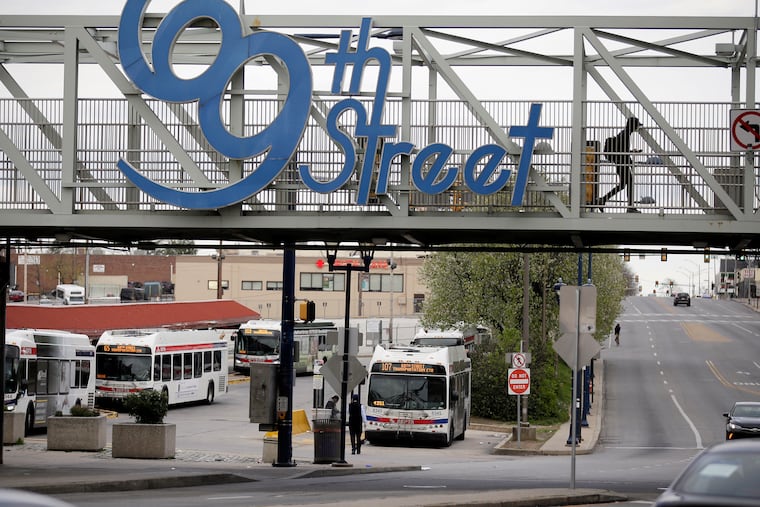SEPTA barred the homeless from the 69th Street terminal due to coronavirus concerns. Now Upper Darby is trying to find them.
"It really highlights the fragility of how we deal with homeless, in the system where everyone knows these transit stations are kind of de facto homeless shelters," said Vince Rongione, an Upper Darby administrator.

Sometime last week, SEPTA ended the homeless encampment at the 69th Street Transportation Center in Upper Darby. And then the agency barred anyone who was not a customer from the busy transit hub.
That entrenched population that had congregated at 69th Street dispersed. Now, Upper Darby is trying to find its members.
“Don’t get me wrong, I completely understand SEPTA’s need to protect their employees and the essential employees that need to use the system to get to work," Vince Rongione, Upper Darby’s chief administrative officer, said Sunday.
“The problem is, it really highlights the fragility of how we deal with homeless in a system where everyone knows these transit stations are kind of de facto homeless shelters."
Rongione said the township was “working hard to find out and figure out” where the homeless population, which he estimated at about 100, ended up.
At a time when volunteer organizations and churches have cut back or ceased operations entirely, he said “people are very concerned.” Efforts to reach the director of the Life Center of Eastern Delaware County, a homeless shelter on 63rd Street, were unsuccessful.
Rongione said he was concerned that Upper Darby had not been consulted nor notified before SEPTA moved in and acted at the 69th Street terminal, restricting it to anyone other than ticketed riders. The typically busy public transportation nexus just over the Philadelphia city line connects the Market-Frankford El with the Norristown High Speed Line and suburban bus lines.
SEPTA has instituted similar policies at other busy hubs, including the Frankford Transportation Center at the other end of the Market-Frankford El, and at Jefferson Station.
“We were caught off guard," Rongione said.
SEPTA spokesperson Andrew Busch said the new policy began about mid-week, but said nobody was forcibly removed from the 69th Street terminal by SEPTA police or other employees. He said SEPTA had a responsibility to make the busy stations safe for the people still needing to use the rail lines, most of whom are working at hospitals and other essential businesses.
“We’re trying our best here to communicate stuff,” said Francis Kelly, SEPTA’s assistant general manager for public and governmental affairs. “Unfortunately, if that didn’t get communicated, I’m sorry.”
Kelly said the agency had no choice but to restrict access to the busy terminals, and said it was working on other related problems, including people boarding at the rear doors of buses and riding buses with no apparent destination.
“It’s a vulnerable population,” said Kelly. “They’re all over the system. That’s why we have a concerted effort to limit access as much as we possibly can.”
But Rongione said he was concerned about locating those who were displaced in order to provide services and would be working with Delaware County officials and local homeless service providers.
U.S. Centers for Disease Control and Prevention guidelines state that, “Unless individual housing units are available, do not clear encampments during community spread of COVID-19."
Clearing encampments, the CDC says, "can cause people to disperse throughout the community and break connections with service providers. This increases the potential for infectious disease spread.”
Delaware County Councilmember Monica Taylor said Sunday the county would be working with Upper Darby to develop a plan for the newly vulnerable homeless, including creating sanitation areas near 69th Street and setting up additional shelters.
One location under consideration as a temporary short-term shelter was the former Watkins Avenue Senior Center, she said. “There are not as many supports in place due to the COVID-19 pandemic,” she said. “Some of [the dispersed] are newly homeless. We have to figure out how to get them into rapid rehousing.”
Especially with funds coming to Upper Darby from the stimulus program, Rongione said, it was critical to locate the people who could benefit. “On Day 1 and Day 2, we might have had a really good shot at providing those services,” Rongione said. “It’s Day 5. Now they’re dispersed.”